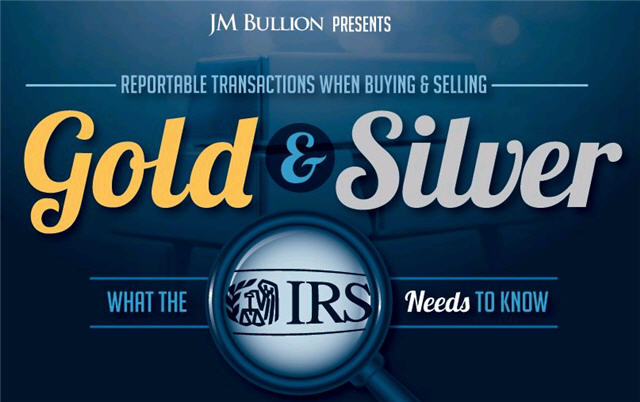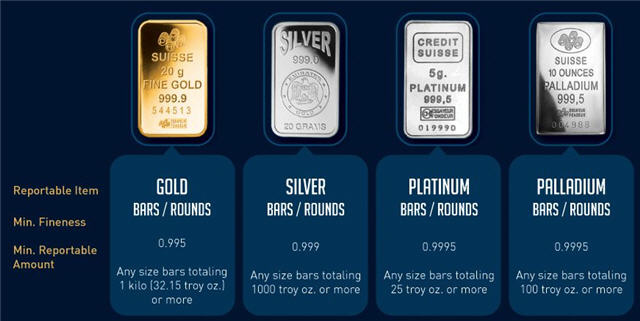Buy & Sell Gold & Silver With Privacy

This does NOT mean that you do not have tax consequences when you sell (see a competent tax advisor for all tax issues – we do NOT provide investment or tax advice). We have covered this topic regarding online Gold accounts here.
What it does mean is that you do not have to provide personal identity details to a coin shop where you sell your Gold or Silver if you know what the law requires – and what it does not.
Gold, Silver, Platinum, Palladium Not All Equal
When understanding what is reportable, first make note that not all four metals are treated equally…
Based on the image above, Platinum is the MOST reportable in bar form, only 25 ounces triggers the threshold.
And when it comes to 1 ounce Gold sovereign coins, Canadian Maple Leafs at .9999 fine are tossed into the same category as the lower purity Mexican Onza and South African Krugerrand (all at 25 coin threshold).
Exempt Gold & Silver Coins
The bullion coins we are most interested in (although we like Maples a lot…) are those that simply are exempt from reporting.
US Gold Eagles, Austrian Philharmonics, Chinese Pandas (very pretty coin) are all 1099 exempt. (At the current time, ALL subject to change without notice by the IRS)
Note, however, that some coins are not on the exempt list – we are told by the infographic – because they were not in existence when that list was created (like the U.S. Silver Eagle), but it is still exempt along with the Gold Eagles.
On the exempt list you will find Austrian coins, Canadian FRACTIONAL Gold and all Silver Maples, Chines Pandas, Australian Perth mint coins, US Buffalo Gold.
What About Cash?
The infographic/video will also give you some description of what constitutes “cash” as we know you may be wanting to buy or sell those exempt bullion coins in U.S. currency.
Well, Form 8300 is there to snag you if you run afoul.
Cash can be: a cashiers check, money order, bank draft, or traveler’s check.
Cash is NOT: check drawn on your own account, bank wire, credit/debit cards, PayPal, or ACH payments.
Remember that you must not split up transactions just to avoid the $10,000 threshold; those transactions are aggregated when done within a short span of time.
Also, ANY transaction CAN be reported if deemed “suspicious” by the person on the other side of the counter. That is more likely to happen at a bank, I think, than your typical local coin dealer who is probably no more anxious to report the transaction than you are.
Storing Gold At Home
Naturally this is all pretty irrelevant for any metal that you are not storing at home; and we make an argument often that you want to think twice about storing precious metals at home. Not that you shouldn’t, just make sure you are going to be COMFORTABLE with the metals in your home, even after they have appreciated significantly in value and that it won’t cause you to lose sleep at night or fear leaving your home unprotected to take a simple vacation (which we also recommend).
Bottom Line
Follow the law; the penalties are simply to severe to risk it!
Yet, why trust ANYONE with your identity details when both government (aka HealthCare.gov) and corporations who HAVE THE RESOURCES to protect your privacy don’t (aka Target, etc) if you don’t have to?
Just simply walk in with your bullion, walk out with your cash. End of story. No need for anyone to have your name and address that could find its way into the hands of someone who just might wonder if you have more where that came from!
To see the JM Bullion infographic directly, you can find it by CLICKING HERE.
Please see the video below instead as the infographic on their site has changed, even though we don’t believe the information is out of date.
